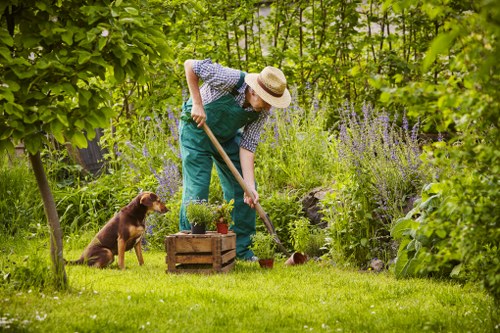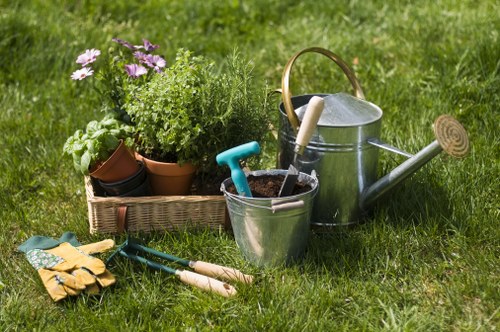Garden Maintenance in Highbury
Introduction to Garden Maintenance

Maintaining a beautiful garden in Highbury requires dedication, knowledge, and the right set of tools. Whether you're a seasoned gardener or a beginner, understanding the essentials of garden maintenance can help you create a vibrant and thriving outdoor space.
Highbury's unique climate and soil conditions play a significant role in determining the types of plants that will flourish. Proper maintenance ensures that your garden remains healthy, aesthetically pleasing, and resilient against pests and diseases.
In this guide, we'll explore various aspects of garden maintenance specific to Highbury, offering tips and techniques to keep your garden in top shape all year round.
Seasonal Garden Care

One of the keys to successful garden maintenance is adjusting your care routines according to the seasons. Each season presents its own set of challenges and opportunities for your garden.
Spring: This is the perfect time to prepare your garden for the growing season. Start by clearing any debris, pruning dead branches, and preparing the soil for planting. It's also an excellent time to plant new flowers, vegetables, and herbs.
Summer: During the warmer months, focus on regular watering, weeding, and pest control. Ensure that your plants receive adequate sunlight and consider using mulch to retain moisture in the soil.
Autumn Maintenance

Autumn is a crucial period for preparing your garden for the winter months. Rake fallen leaves to prevent them from suffocating your plants, and mulch perennials to protect their roots from frost. It's also a good time to plant bulbs for spring blooms.
Winter Care: While many plants go dormant during winter, some require special attention. Protect sensitive plants with coverings, and use evergreen species to maintain garden structure. Regularly check for any damage caused by harsh weather conditions.
Essential Gardening Tools

Having the right tools is essential for efficient garden maintenance. Investing in quality equipment can make tasks easier and more enjoyable.
- Pruning Shears: Ideal for trimming and shaping plants.
- Garden Fork: Perfect for aerating the soil and removing weeds.
- Hose and Sprinklers: Ensure your garden receives consistent watering.
- Wheelbarrow: Helpful for transporting soil, plants, and debris.
- Gloves: Protect your hands from thorns, dirt, and chemicals.
Regularly maintain your tools by cleaning and storing them properly to extend their lifespan.
Soil Health and Fertilization

The foundation of a healthy garden lies in the quality of the soil. Highbury's soil can vary, so it's important to test its pH levels and nutrient content to determine what amendments are needed.
Organic matter such as compost can greatly enhance soil structure, providing essential nutrients and improving water retention. Regularly adding compost or well-rotted manure can promote vigorous plant growth.
Fertilization should be tailored to the specific needs of your plants. Use a balanced fertilizer to provide essential nutrients, and consider slow-release options for long-term nourishment.
- Nitrogen: Promotes leafy growth.
- Phosphorus: Encourages root development.
- Potassium: Enhances overall plant health.
Mulching Techniques
Mulching is a vital practice in garden maintenance. It helps regulate soil temperature, conserve moisture, and suppress weeds.
Organic mulches, such as bark, straw, or leaf mold, add nutrients to the soil as they decompose. Apply a layer of mulch around your plants, ensuring it's not piled against stems or trunks to prevent rot.
Plant Selection and Care
Choosing the right plants is crucial for a thriving garden. Highbury's climate supports a wide variety of flora, but selecting species that are well-suited to local conditions will reduce maintenance efforts.
Consider factors such as sunlight, soil type, and water requirements when selecting plants. Native plants often require less maintenance and are more resistant to local pests and diseases.
Regularly monitor your plants for signs of stress or disease. Early detection and intervention can save your garden from more significant problems down the line.
- Watering: Ensure plants receive appropriate amounts of water based on their specific needs.
- Pruning: Regularly remove dead or diseased branches to promote healthy growth.
- Pest Control: Use natural or chemical methods to manage unwanted pests without harming beneficial insects.
Companion Planting
Companion planting involves grouping plants that benefit each other in the same space. This technique can enhance growth, improve pest resistance, and conserve resources.
For example, planting marigolds alongside vegetables can deter pests, while beans can fix nitrogen in the soil, benefiting neighboring plants.
Lawn Care in Highbury
A well-maintained lawn can be the centerpiece of your garden. Proper lawn care involves mowing, watering, aerating, and fertilizing.
Mowing: Keep your lawn at an optimal height to encourage healthy grass growth. Avoid cutting more than one-third of the grass blade at a time to prevent stress.
Watering: Water your lawn deeply but infrequently to promote deep root growth. Early morning is the best time to water to reduce evaporation and fungal growth.
- Aeration: Periodically aerate your lawn to improve soil compaction and enhance nutrient absorption.
- Fertilization: Apply a balanced fertilizer to provide essential nutrients for lush, green grass.
- Weed Control: Use herbicides or manual removal to keep weeds at bay.
Seasons and Lawn Care
Adjust your lawn care practices based on the season. In spring, focus on dethatching and fertilizing. During summer, prioritize watering and pest control. In autumn, prepare your lawn for winter by overseeding and applying a final fertilizer.
Irrigation Systems
Efficient irrigation is essential for maintaining a healthy garden. Installing an irrigation system can save time and ensure consistent watering.
There are various types of irrigation systems available, including drip irrigation, sprinkler systems, and soaker hoses. Each has its advantages depending on the specific needs of your garden.
- Drip Irrigation: Delivers water directly to the plant roots, reducing evaporation and water waste.
- Sprinkler Systems: Suitable for lawns and larger garden areas.
- Soaker Hoses: Ideal for garden beds and container plants.
Consider incorporating timers and moisture sensors to optimize water usage and prevent overwatering.
Rainwater Harvesting
Harvesting rainwater is an eco-friendly way to provide your garden with natural irrigation. Installing rain barrels or cisterns can capture and store rainwater for later use.
Using harvested rainwater reduces reliance on municipal water supplies and promotes sustainability in garden maintenance.
Pest and Disease Management
Maintaining a healthy garden involves managing pests and diseases effectively. Integrated Pest Management (IPM) is a sustainable approach that combines biological, cultural, and chemical methods.
Begin by identifying the pests or diseases affecting your plants. Understanding the problem allows you to choose the most appropriate treatment.
- Biological Controls: Introduce natural predators like ladybugs to control aphids.
- Cultural Controls: Rotate crops and practice good sanitation to prevent disease spread.
- Chemical Controls: Use pesticides sparingly and opt for environmentally friendly options when necessary.
Regular monitoring and early intervention are crucial in preventing minor issues from escalating.
Organic Gardening Practices
Adopting organic gardening practices can lead to a healthier and more sustainable garden. This involves using natural fertilizers, compost, and organic pest control methods.
Organic gardening enhances soil fertility, promotes biodiversity, and reduces the environmental impact of your garden maintenance activities.
Hardscaping and Garden Structures
Incorporating hardscaping elements like paths, patios, and fences can enhance the functionality and aesthetics of your garden.
Choose materials that complement the overall design and are suitable for Highbury's climate conditions. Proper maintenance of these structures ensures their longevity and appearance.
- Paths and Walkways: Define garden zones and provide easy access to different areas.
- Patios: Create outdoor living spaces for relaxation and entertainment.
- Fences and Walls: Offer privacy and structure to your garden layout.
Regular cleaning and repairs are essential to keep these structures in good condition.
Garden Lighting
Proper lighting enhances the beauty of your garden and extends its usability into the evening hours. Install a variety of lighting options, including ambient, task, and accent lighting.
Solar-powered lights are an eco-friendly choice, reducing energy consumption while providing illumination.
Eco-Friendly Garden Practices
Embracing eco-friendly garden practices contributes to sustainability and reduces the environmental footprint of your garden maintenance.
Composting: Recycle kitchen scraps and garden waste to create nutrient-rich compost for your plants.
Water Conservation: Implement drought-resistant plants and efficient irrigation systems to minimize water usage.
- Native Plants: Choose species that are adapted to the local climate and require less maintenance.
- Organic Fertilizers: Use natural alternatives to chemical fertilizers to maintain soil health.
- Recycled Materials: Incorporate recycled materials in garden structures and decorations.
Benefits of Sustainable Gardening
Sustainable gardening not only benefits the environment but also enhances the overall health and resilience of your garden. It promotes biodiversity, reduces waste, and fosters a deeper connection with nature.
By adopting sustainable practices, you contribute to the well-being of your local ecosystem while enjoying a beautiful and thriving garden.
Professional Garden Maintenance Services in Highbury
For those who prefer to leave garden maintenance to the experts, several professional services are available in Highbury. These services offer comprehensive maintenance plans tailored to your garden's specific needs.
Professional gardeners can provide expertise in plant selection, design, and ongoing care, ensuring that your garden remains pristine throughout the year.
- Regular Maintenance: Scheduled visits for tasks like mowing, pruning, and weeding.
- Seasonal Clean-Up: Preparing your garden for the changing seasons with appropriate care.
- Specialized Services: Landscape design, irrigation installation, and pest management.
Investing in professional garden maintenance can save you time and ensure that your garden reaches its full potential.
Choosing the Right Service
When selecting a garden maintenance service in Highbury, consider factors such as experience, range of services, and customer reviews. Ensure that the service provider aligns with your garden's specific requirements and your personal preferences.
Requesting a consultation can help you assess the suitability of the service for your garden.
DIY Garden Maintenance Tips
For garden enthusiasts who prefer a hands-on approach, incorporating DIY maintenance can be rewarding and cost-effective.
Planning: Create a maintenance schedule to stay organized and ensure that all tasks are completed timely.
Education: Continuously educate yourself about gardening techniques, plant care, and new trends to enhance your skills.
- Resource Management: Efficiently manage your time and resources to maximize productivity.
- Tool Maintenance: Keep your gardening tools in good condition to ensure their effectiveness.
- Creative Projects: Engage in projects like building raised beds, creating compost bins, or designing garden art.
Embracing DIY practices can lead to a more personalized and fulfilling gardening experience.
Overcoming Common Challenges
Gardening comes with its set of challenges, but with the right strategies, you can overcome them effectively.
Issues such as pests, diseases, and unfavorable weather conditions can be managed with proactive planning and adaptation.
Conclusion
Effective garden maintenance in Highbury involves a combination of planning, knowledge, and consistent effort. By understanding the unique aspects of the local climate, selecting appropriate plants, and implementing sustainable practices, you can cultivate a garden that is both beautiful and resilient.
Whether you choose to maintain your garden yourself or enlist the help of professionals, prioritizing regular care and attention will ensure that your garden remains a source of pride and enjoyment for years to come.
Ready to transform your garden? Contact us today to book your garden maintenance service and let our experts help you achieve the garden of your dreams.

